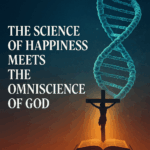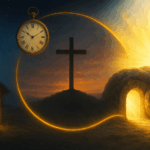“Come Thou Fount – Hymns/Songs that Bless Us” – Hymn 686
Introduction: Robert Robinson
“Come, Thou Fount of Every Blessing” was written by Robert Robinson in 1758. Robinson wasn’t as disobedient and rebellious as we heard John Newton was, but his early life was no angelic thing.
One line in the third verse, “Prone to wander, Lord, I feel it, prone to leave the God I love,” is thought to be particularly autobiographical, referring to Robinson’s early life. Whereas Newton lost his mother at the age of 7, Robinson lost his father at the age of 8. To add insult to injury, his maternal grandfather disinherited him. His mother sent him to London to be an apprentice barber, so that he could support his widowed mother. It was during this time, according to hymnologist Kenneth Osbeck, that “he associated with a notorious gang of hoodlums and lived a debauched life.” However, it was also in London that he experienced the powerful influence of the preaching of a man named George Whitefield. It was only three years after his conversion to Christianity that Robinson wrote this beautiful hymn. He went on to spend some thirty years as the pastor of a church in Cambridge.
Robinson saw in himself that he was “prone to wander,” “prone to leave the God he loved.” Sadly, there were periods of his life – even after his conversion – when he did wander. He lapsed back into sinful ways, had periods of great spiritual instability, and even toyed with false doctrines opposed to the truth of Scripture.
One day when he was much older, he was riding in a stagecoach, traveling through the English countryside. A woman sitting near him in the coach was obviously enjoying a hymn she was reading – “Come, Thou Fount.” She was humming the tune, and singing the words aloud. She turned to the stranger beside her, held the open hymnbook out to him, and asked him if he had ever heard that hymn. The stranger was silent for a long moment, and then he burst into tears. He said to her, “Madam, I am the poor, unhappy man who composed that hymn many years ago. I would give a thousand worlds, if I had them, to enjoy the feelings that I had then.” Some 30 years later, the very words he had penned had been returned to him, by the grace and providence of God, to tune his heart toward God once again.
Apparently, Robinson wrote this hymn for Pentecost. That festival of Pentecost has a Holy Spirit fire theme, but in John 7, Jesus referred to the Holy Spirit when He spoke of streams of living water flowing from within believers. Let’s dig into the lyrics…
v. 1 – Fount of blessing/Tune my heart
Come thou fount of ev’ry blessing Tune my heart to sing thy grace
Streams of mercy, never ceasing Call for songs of loudest praise
While the hope of endless glory Fills my heart with joy and love
Teach me ever to adore thee May I still thy goodness prove
Robinson begins with allusions to water in verse 1. If it’s true that he wrote the hymn for Pentecost then he credits the Holy Spirit with being the fount of every blessing and the source of endless streams of mercy. Here you need to picture something like a mountain stream that continues to pour down the mountainside, even in the cold temperatures of winter OR maybe a spring of water, a fountain, that bubbles up from some underground source. Just as we heard Thomas Ken – a couple of weeks ago – praise God from whom ALL blessings flow, so Robinson speaks of EVERY blessing that we receive from the Holy Spirit.
What’s unusual about this image for God’s blessing, and about Jesus’ reference to streams of living water, is that rivers are not a dominant feature of the geography of Israel. WE seem to have little streams flowing down from every mountainside here in the lower mainland, but besides the Jordan River, there are few significant waterways in Israel. In fact, a lot of Israel is arid, desert-like, especially south of Jerusalem. Some of the sources of water were wadis – dried up river beds that would fill up briefly during a rain. That temporary water supply was a blessing because it provided what plants and animals and humans all needed for their survival.
More common would have been wells as the source of drinkable water. So, we have that famous story in John 4 of Jesus meeting a Samaritan woman at Jacob’s well just outside of the town of Sychar. Jesus asked her for a drink from the well, but ended up offering her living water – water that leads the drinker to not be thirsty again, a spring of water welling up to eternal life. Jesus was not talking about H2O, but about spiritual water, living water for a thirsty soul.
We can imagine that that’s what Robert Robinson had in mind. Listen to the “every blessing” that he mentions in just verse 1: grace, mercy, hope, joy, love and goodness. Those are the streams of eternal-life water that the Holy Spirit pours freely – as a fountain – into our lives.
There is another key phrase in verse 1 – “tune my heart.” Usually a couple of times a year, we call on a man to come out and tune our pipe organ. If you have a real piano (with strings) you know that the changing temperatures in a room can see those strings expand or contract, and they need tuning, too. Before somebody plays a guitar or a violin, they also tune the strings so that they are in perfect pitch.
Like an instrument, all human beings were created for a purpose: to “sing” God’s “grace” with “loudest praise.” But we are always getting out of tune; our hearts are always selfishly chasing the wrong things – being loved by everybody, accumulating possessions and things, positions of power and prestige in our family or at our place of work, security, approval, the latest trend, outer beauty and youth (the fountain of youth!). Just as musicians have to tune their guitar or violin each time before performing, so too we, as human instruments of God’s will, must ask for God’s help, to tune our hearts to recognize God’s grace, God’s every blessing, and to tune our hearts to His perfect pitch of loving Him with our entire being, and of loving our neighbour as ourselves. It’s by His “streams of mercy” that He teaches us, tunes us to realign with His purpose of “redeeming love.” (and those are alternate words to end verse 1)
What streams of mercy have you experienced in your life? A few years ago, our son almost drowned on a rafting trip on a fast-moving river. It’s God’s mercy that we still have our son, and that we have those two grandchildren. Maybe you have experienced a miracle-like healing, or the unexpected provision of a job, or certain forgiveness for a repeated sin, or a rescued marriage, or a renewed and vibrant faith. Look back… and see those events as streams of God’s mercy.
v. 2 – Ebenezer/Precious blood
Here I raise my Ebenezer Hither by thy help I’m come
And I hope, by thy good pleasure Safely to arrive at home
Jesus sought me when a stranger Wand’ring from the fold of God
He, to rescue me from danger Interposed his precious blood
One of the most obvious biblical allusions appears in stanza two: “Here I raise my Ebenezer, hither by thy help I’ve come.” If it were not for Ebenezer Scrooge in Charles Dickens’ “A Christmas Carol,” you may not be at all familiar with the word ‘Ebenezer.’ (But Dickens’ Ebenezer Scrooge arrived about 100 years after Robinson’s Ebenezer!)
Now, don’t feel Biblically illiterate if you are unfamiliar with the word ‘Ebenezer.’ It only occurs 3 times in the Bible – all of them in 1 Samuel. Twice it refers to a town west of Jerusalem, near Philistine territory. The third time, it comes in the context of a story. In chapter 7, the Philistines drew near to attack Israel. The people of Israel petitioned Samuel the judge/prophet to pray to God to save them. He did. God did. After the Philistines had been defeated, Samuel set up a stone and called it ‘Ebenezer’ which means “stone of help,” and he explained “Thus far the Lord has helped us.” That stone was to be a visible monument and reminder and testimony that God had fought for and saved them in the battle against the Philistines.
There are other similar Old Testament stories where stones or altars made of stones were to be reminders of God’s gracious action on behalf of His people, that He was the fount of their every blessing. When Jacob had a dream about angels going up and down on a ladder to heaven, he set up a stone and called it Bethel – the house of God. When the Israelites crossed the Jordan River on dry ground after a 40-year journey in the desert, they pulled up twelve stones from the river bed and set up an inukshuk kind of thing on the Israel side of the river. In the future, when children asked what those stones were about, it would give elders an opportunity to tell about God drying up the waters until the people got across. At the end of Joshua’s life, after a successful take-over of the Promised Land, he encouraged the people, before they dispersed to their homes, to continue to believe in and serve God. They voiced their willingness to do that, and Joshua set up a large stone that had “heard” their promises. That stone would be an enduring testimony to what had been spoken that day, and it, too, was like an Ebenezer stone to remember God’s provision and help.
Does Robert Robinson call his hymn an Ebenezer stone for him to acknowledge God’s faithful help in the past? Or perhaps he has some imaginary stone in mind that would inspire his trust in God even into the future, until he safely arrives at home. In the hymn, the idea is that we will be motivated to greater praise when we remember how God has helped us in the past. That help has come chiefly in Jesus having “sought” us when we were “strangers” and “wandering” away from God. It was not we who found God, but rather God who came to “rescue” us from spiritual and eternal danger. I love the word ‘interposed’ that Robinson chose to describe that action of Jesus. He interposed His own gracious and precious blood. He positioned his blood between the danger and us. Picture a mother bear positioning herself between her cubs and some foolish human beings in her habitat that she sees as a threat to the safety and well-being of her little ones. That’s what God has done – placing Jesus’ blood in between so that that ultimate danger, death and damnation can never reach us. This is what we read in 1 Peter 1:18-19 – that it wasn’t silver or gold, but the precious blood of Jesus that has bought us, that has paid the ransom price to rescue us.
Do you have some sort of Ebenezer in your life – probably not a rock, but something you have, or something you do to remember God’s faithfulness? Maybe you journal and highlight answered prayers. Or perhaps you have crosses, Christian plaques or artwork on the walls in your house. Maybe you have bookmarks in your Bible at meaningful passages, or you regularly listen to Christian music, or you worship EVERY SUNDAY – that’s your Ebenezer. Or maybe you’re not so intentional, but random, or maybe even forgetful of God’s faithfulness, which leads us to v. 3.
v. 3 – Prone to wander/Indebted to grace
Oh, to grace how great a debtor Daily I’m constrained to be
Let that grace now like a fetter Bind my wand’ring heart to thee
Prone to wander, Lord, I feel it Prone to leave the God I love
Here’s my heart, O take and seal it Seal it for thy courts above
The second half of the verse takes us to Robinson’s attitude – prone to wander, prone to leave God, prone to forget that He is the fount of every blessing. I think we all can identify with that – prone to wander. It might be those summer Sundays when worship attendance is sporadic, and then it stretches into the fall, and then it becomes a habit to not attend. It might be a laziness to crack open the Bible or to get down on our knees to pray. It might be a weakness to some temptation or other. It might be tight and guarded lips when conversation turns to ridiculing Jesus and His Church. Whether it is words or thoughts or actions, there is that danger of leaving God and residing in our sinfulness.
Robinson’s third verse is a two-fold prayer. The first part is a prayer to fully recognize the magnitude of what God has done for us, and then to realize that every day, every SINGLE day, we rely on God’s grace and forgiveness in Jesus to restore our relationship with Him. It’s a prayer to connect that “prone to wander” heart back to God in gratitude for His grace.
The second part of the prayer concludes the verse – take my heart, seal it, make it yours, now and eternally. That, too, is the work of the Holy Spirit. That’s what St. Paul says clearly in Ephesians 1 – “You also, when you heard the word of truth, the gospel of your salvation, and believed in Him, were sealed with the promised Holy Spirit, who is the guarantee of our inheritance until we acquire possession of it.” In New Testament times a seal marked ownership. Whether it was a wax seal on a letter that marked the identity of the sender, or a brand or piercing or tattoo that indicated the owner of an animal or a slave, the concept of a seal showed who belonged to who. By our Baptisms, we belong to Christ.
So, this third verse calls on us to remember, in repentance, that we are prone to wander from God. But more importantly it calls on us to remember that our hearts are sealed by Him, and for Him, for now and for all eternity – for Thy courts above.
v. 4 – That day/Ransomed soul
Oh, that day when freed from sinning, I shall see Thy lovely face
Clothed then in the blood-washed linen How I’ll sing Thy wondrous grace
Come, my Lord, no longer tarry Take my ransom’d soul away
Send Thine angels soon to carry Me to realms of endless day
That brings us to the fourth and final verse. It refers to “that day” – that final day when either the curtain closes on human existence or that day when Robinson, himself, takes his final breath and enters the “realms of endless day.” It’s really the climax, the hope of Robinson’s initial prayer of invitation to the Holy Spirit, the Fount of every blessing. On that day, he says, he will enthusiastically sing about God’s grace, and he employs two Biblical images to describe his status on “that day.”
The first image is “clothed in blood-washed linen.” This image is from Revelation 7, where a great multitude from every nation, tribe, people and language worship God before His heavenly throne. They are identified as those who “have washed their robes and made them white in the blood of the Lamb / Jesus.” You wouldn’t normally think of washing linen in blood, but our lives are made clean and white by the blood of Jesus shed on the cross. He covers us, then, with His white robes of righteousness, and we have the proper spiritual clothing to enter heaven.
The second image is that of being a “ransomed soul.” The word ‘ransom’ naturally reminds us of a kidnapping or hostage-taking situation, or these days a cyber-attack on your computer. Someone is demanding money in exchange for the release of the person (or the computer). The money is called a ‘ransom.’ But Robinson is talking about ‘ransom’ on a spiritual level – a ransomed soul.
The devil is the one who has kidnapped us and made us captive to sin. But again, Jesus, by His holy and precious blood interposed between us and that danger, death and damnation, has paid the ransom price and we are freed – freed to be taken to the realms of endless day. And that, too, is a prompt for us to sing God’s wondrous, undeserved grace. All that’s left is for us to sing the hymn:








